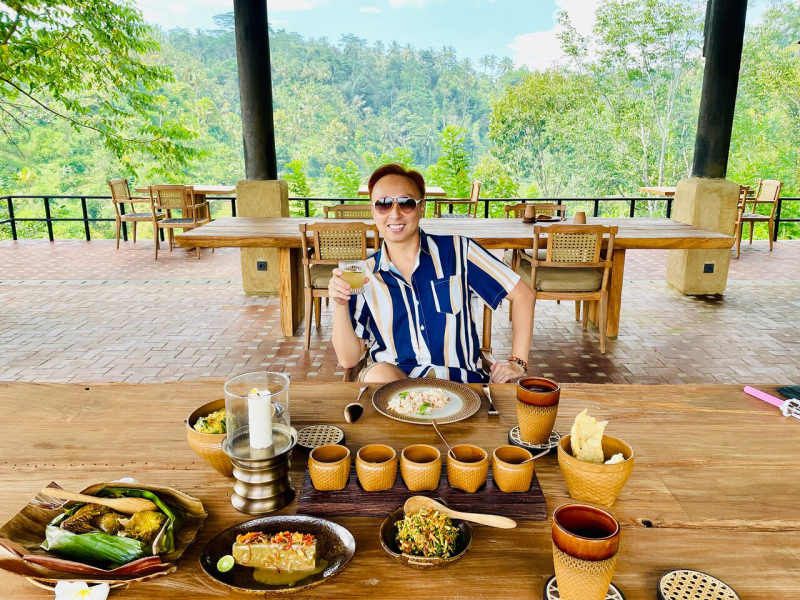In an era where environmental awareness and mindful living are gaining traction, the quest for sustainable experiences has become a defining trend. From savoring farm-to-table feasts that celebrate local flavors to immersing oneself in the tranquility of forest bathing, a diverse and delectable menu of sustainable options awaits those seeking to tread lightly on the planet while indulging their senses. This exploration delves into a world where sustainability intertwines with gastronomy, nature, travel, wellness, and everyday living, offering a tapestry of enriching encounters for every taste and inclination.

Introduction – From Farm-to-Table Feasts to Forest Bathing Bliss
The concept of sustainability has transcended its niche origins to become a global movement, shaping choices across various facets of life. Sustainable experiences, characterized by their minimal environmental impact and positive social contributions, have emerged as a beacon for conscious consumers. These experiences span a spectrum of activities, from culinary adventures that support local farmers to nature-based escapes that foster a deeper connection with the natural world. As the demand for sustainable options grows, so does the diversity and accessibility of these experiences, catering to a wide array of interests and preferences.
The allure of sustainable experiences lies not only in their ethical and environmental appeal but also in their ability to enhance personal well-being. Studies have shown that engaging in sustainable practices can lead to reduced stress levels, increased happiness, and a greater sense of purpose. By choosing sustainable experiences, individuals can contribute to a healthier planet while also nurturing their own physical, mental, and emotional health. The symbiotic relationship between sustainability and personal well-being underscores the transformative power of conscious choices.
In this exploration, we embark on a journey through a curated selection of sustainable experiences, each offering a unique blend of enjoyment and responsibility. From the tantalizing aromas of farm-to-table cuisine to the serene embrace of ancient forests, we’ll uncover a world where sustainability is not just a buzzword but a way of life. Whether you’re a food enthusiast, a nature lover, an avid traveler, or simply someone seeking a more mindful existence, there’s a sustainable experience waiting to nourish your soul and leave a positive imprint on the world.
Savoring Sustainable Flavors: Farm-to-Table Feasts
The farm-to-table movement has revolutionized the culinary landscape, reconnecting diners with the origins of their food and fostering a deeper appreciation for the intricate web of relationships that sustain our nourishment. At its core, farm-to-table dining emphasizes the use of locally sourced, seasonal ingredients, often procured directly from farmers and producers within a limited radius. This approach not only supports local economies and reduces the carbon footprint associated with long-distance food transportation but also guarantees the freshness and flavor of the ingredients.
The benefits of farm-to-table dining extend beyond the plate, encompassing a range of environmental, social, and personal advantages. By choosing farm-to-table options, consumers contribute to the preservation of agricultural land, the reduction of greenhouse gas emissions, and the promotion of biodiversity. Moreover, farm-to-table dining fosters a sense of community and connection, allowing diners to forge relationships with the farmers and producers who cultivate their food. On a personal level, farm-to-table experiences offer a sensory delight, as the vibrant flavors and textures of freshly harvested ingredients tantalize the taste buds.
A plethora of farm-to-table experiences awaits those eager to embark on a culinary adventure. Visiting farmers’ markets, where local farmers showcase their bounty of seasonal produce, is an excellent way to immerse oneself in the farm-to-table ethos. Farm dinners, hosted on picturesque farms and featuring multi-course meals prepared with ingredients sourced directly from the surrounding fields, provide an intimate and immersive dining experience. For those seeking a hands-on approach, cooking classes led by chefs or farmers offer the opportunity to learn the art of preparing farm-fresh ingredients and gain insights into sustainable culinary practices.
In addition to these established experiences, a growing number of innovative farm-to-table initiatives are emerging, further blurring the lines between farm and fork. Some restaurants have embraced the concept of “edible landscaping,” incorporating gardens and greenhouses into their premises to grow their own produce. Others have partnered with local farms to offer “farm stays,” where guests can experience the rhythms of farm life firsthand and participate in harvesting and food preparation activities. These evolving trends exemplify the dynamic nature of the farm-to-table movement and its potential to create a more sustainable and connected food system.

Immersing in Nature’s Embrace: Forest Bathing Bliss
In a world dominated by digital distractions and urban clamor, the practice of forest bathing, or Shinrin-yoku, offers a sanctuary of serenity and rejuvenation. Originating in Japan in the 1980s, forest bathing involves immersing oneself in the sights, sounds, and scents of a forest environment, allowing nature’s therapeutic embrace to soothe the mind, body, and spirit. Unlike hiking or other outdoor activities that focus on physical exertion, forest bathing emphasizes mindful presence and sensory engagement, inviting participants to slow down, breathe deeply, and simply be in the moment.
The therapeutic benefits of forest bathing are well-documented, with numerous studies highlighting its positive impact on physical and mental health. Exposure to phytoncides, the airborne chemicals emitted by trees, has been shown to boost the immune system, reduce stress hormones, and lower blood pressure. The calming atmosphere of the forest, with its gentle rustling leaves, dappled sunlight, and earthy aromas, can induce a state of relaxation and mental clarity, promoting emotional well-being and cognitive function. Forest bathing has also been linked to improved sleep quality, increased creativity, and enhanced overall vitality.
Practicing forest bathing is a simple yet profound experience that requires no special equipment or expertise. Finding a suitable location, such as a wooded park, nature reserve, or even a backyard with mature trees, is the first step. Once in the forest, the key is to engage all senses, noticing the textures of bark and leaves, the songs of birds and insects, the fragrance of damp earth and pine needles. Walking slowly and deliberately, pausing to observe the intricate details of the natural world, can deepen the connection with the forest environment.
The essence of forest bathing lies in letting go of distractions and surrendering to the present moment. It’s about allowing the forest to wash over you, to become a part of its intricate tapestry. As you wander through the woods, your mind gradually quiets, your senses sharpen, and a sense of peace and tranquility envelops you. The forest becomes a mirror, reflecting your inner state and offering a space for self-discovery and healing. Whether you spend an hour or a whole day in the forest, the benefits of forest bathing linger long after you leave, reminding you of the restorative power of nature and its ability to nourish the soul.
Exploring Eco-Friendly Adventures: Sustainable Travel – From Farm-to-Table Feasts to Forest Bathing Bliss
Sustainable travel, also known as ecotourism, is a philosophy that emphasizes responsible and mindful exploration of the world. It goes beyond simply visiting new destinations; it’s about minimizing environmental impact, supporting local communities, and preserving cultural heritage. Sustainable travel recognizes the interconnectedness of tourism and the environment, striving to create a positive legacy for both travelers and the places they visit.
The principles of sustainable travel encompass a range of practices, from choosing eco-friendly accommodations and transportation options to respecting local customs and traditions. Sustainable travelers prioritize experiences that benefit local communities, such as staying in locally owned guesthouses, dining at family-run restaurants, and purchasing souvenirs from local artisans. They also strive to minimize their ecological footprint by reducing waste, conserving water and energy, and avoiding activities that harm wildlife or natural habitats.
The options for sustainable travel are as diverse as the world itself, catering to a variety of interests and budgets. Eco-lodges, nestled in pristine natural settings and built with sustainable materials, offer a harmonious blend of comfort and environmental consciousness. Wildlife safaris, led by knowledgeable guides who prioritize animal welfare and conservation, provide opportunities to observe animals in their natural habitats without disturbing their ecosystems. Voluntourism programs, where travelers contribute their skills and time to local projects, offer a chance to make a tangible difference in the communities they visit.
Beyond these established options, a wave of innovation is transforming the landscape of sustainable travel. From carbon-neutral cruises powered by renewable energy to regenerative tourism initiatives that actively restore ecosystems, the possibilities for eco-friendly adventures are expanding rapidly. The rise of slow travel, which encourages travelers to savor the journey and immerse themselves in local cultures, further exemplifies the shift towards a more mindful and sustainable approach to exploration.
As travelers become increasingly aware of the environmental and social impact of their choices, the demand for sustainable travel experiences is on the rise. By embracing responsible travel practices and supporting businesses that prioritize sustainability, travelers can contribute to a more equitable and resilient tourism industry. Sustainable travel isn’t just a trend; we need to do it to protect the Earth’s beauty and variety for future generations.

Cultivating a Greener Lifestyle: Sustainable Living – From Farm-to-Table Feasts to Forest Bathing Bliss
Sustainable living is not just a buzzword, but a conscious choice to make everyday decisions that minimize our environmental impact and contribute to a healthier planet. It’s about recognizing the interconnectedness of our actions and their ripple effects on the natural world, and striving to create a harmonious balance between human needs and ecological well-being. Sustainable living encompasses a wide array of practices, from reducing energy consumption and conserving water to minimizing waste and supporting ethical businesses.
Adopting sustainable practices in daily life can seem daunting, but even small changes can make a significant difference. Reducing energy consumption can be as simple as switching to energy-efficient appliances, turning off lights when not in use, and opting for public transportation or cycling instead of driving. Conserving water can be achieved by taking shorter showers, fixing leaky faucets, and collecting rainwater for gardening. Minimizing waste involves reducing, reusing, and recycling, as well as avoiding single-use plastics and opting for products with minimal packaging.
The benefits of sustainable living extend beyond environmental conservation. By reducing our reliance on fossil fuels and other non-renewable resources, we contribute to cleaner air and water, healthier ecosystems, and a more stable climate. Sustainable living also promotes personal well-being, as it encourages mindfulness, resourcefulness, and a deeper connection with the natural world. Moreover, by supporting ethical businesses and fair trade practices, we contribute to social justice and economic equity.
The journey towards sustainable living is a continuous one, with opportunities for learning and growth at every step. It’s about making informed choices, embracing eco-friendly alternatives, and inspiring others to join the movement. From growing your own food to composting organic waste, there are countless ways to integrate sustainability into your lifestyle. The key is to start small, celebrate progress, and remember that every action, no matter how seemingly insignificant, contributes to a greener and more sustainable future for all.
Nurturing Mind and Body: Sustainable Wellness – From Farm-to-Table Feasts to Forest Bathing Bliss
In the pursuit of well-being, the concept of sustainability extends beyond environmental concerns to encompass the holistic health of individuals. Sustainable wellness recognizes the interconnectedness of mind, body, and spirit, and emphasizes practices that promote balance, harmony, and longevity. It’s about nurturing ourselves in ways that are not only beneficial to our own health but also respectful of the natural world and the resources it provides.
Sustainable wellness practices draw inspiration from ancient traditions and modern science, offering a diverse array of approaches to self-care. Yoga, with its emphasis on mindful movement and breath control, cultivates physical strength, flexibility, and mental clarity. Meditation, a practice of focused attention and inner stillness, promotes emotional balance, stress reduction, and spiritual connection. Herbal remedies, derived from plants and natural ingredients, offer gentle and sustainable alternatives to conventional medicine for a range of ailments.
The benefits of sustainable wellness practices are multifaceted, encompassing physical, mental, and emotional well-being. Regular yoga and meditation practice can improve cardiovascular health, reduce chronic pain, and boost immunity. These practices also foster mental resilience, enhance emotional regulation, and cultivate a sense of inner peace. Herbal remedies, when used responsibly and in consultation with healthcare professionals, can support the body’s natural healing processes and promote overall vitality.
Beyond these specific practices, sustainable wellness also entails mindful living and conscious consumption. It’s about choosing foods that nourish the body and support sustainable agriculture, opting for natural personal care products that are free of harmful chemicals, and creating a home environment that promotes relaxation and connection with nature. By prioritizing self-care and making sustainable choices, we can cultivate a sense of well-being that extends beyond ourselves, benefiting both our own health and the health of the planet.

Conclusion – From Farm-to-Table Feasts to Forest Bathing Bliss
In this exploration, we have journeyed through a diverse landscape of sustainable experiences, from farm-to-table feasts that celebrate local flavors to forest bathing retreats that nurture the soul. We have witnessed how sustainability can intertwine with various facets of life, offering a menu of enriching encounters that benefit both individuals and the planet. From savoring the freshness of seasonal produce to immersing ourselves in the tranquility of nature, these experiences remind us of the profound connection between our well-being and the health of the Earth.
As we navigate the complexities of the 21st century, the importance of sustainable choices and actions cannot be overstated. The challenges we face, from climate change to resource depletion, demand a collective shift towards a more mindful and responsible way of living. By embracing sustainability in our everyday lives, we can contribute to a healthier, more equitable, and more resilient future for all.
The menu of sustainable experiences is vast and ever-evolving, offering something for every taste and inclination. Whether you’re drawn to the vibrant energy of farmers’ markets, the serene embrace of ancient forests, the thrill of eco-friendly adventures, or the simple pleasures of sustainable living, there’s an experience waiting to ignite your passion and leave a positive impact on the world.
As we conclude this exploration, we invite you to reflect on your own relationship with sustainability. How can you incorporate more sustainable practices into your daily life? What experiences can you embrace to nourish your mind, body, and spirit while treading lightly on the planet? We will leave behind a world that is different from the one we found it in. Let us choose wisely, consciously, and sustainably.




